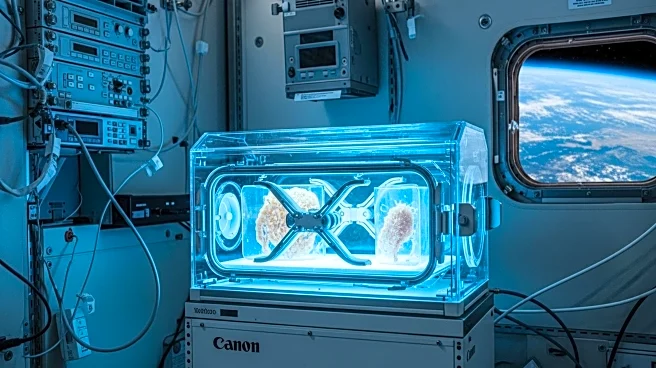What's Happening?
Researchers have conducted a significant experiment aboard the International Space Station (ISS) to explore the effects of space conditions on reproduction. The study, published in the journal Stem Cell Reports, involved cryopreserved mouse spermatogonial stem cells that were kept on the ISS for six months. The primary focus was to assess whether the space environment, particularly exposure to cosmic rays, would cause apoptosis or DNA damage in these cells. The findings revealed that the cells did not exhibit increased apoptosis or DNA damage after their time in space. Upon returning to Earth, the cells underwent a process called spermatogonial transplantation, which is a step towards understanding reproduction in space. The lead author, Mito Kanatsu-Shinohara from Kyoto University, emphasized the importance of determining how long germ cells can be stored in space to aid future human spaceflight.
Why It's Important?
This research is crucial as it addresses one of the significant challenges of long-term human space exploration: reproduction. Understanding how space conditions affect reproductive cells is vital for the future of human colonization of other planets. The absence of DNA damage in the mouse stem cells is a promising indication that reproduction might be feasible in space, although many questions remain. This study could pave the way for further research into human reproduction in space, which is essential for sustaining human life beyond Earth. The findings could also have implications for preserving genetic material during long-duration space missions, potentially benefiting space agencies and private space exploration companies.
What's Next?
Future research will likely focus on extending the duration of germ cell storage in space and exploring other aspects of reproduction in space environments. Scientists will need to address additional questions, such as the effects of microgravity on embryonic development and the long-term viability of offspring conceived in space. These studies will be critical for planning future missions that involve human settlement on other planets. Collaboration between international space agencies and research institutions will be essential to advance this field of study.
Beyond the Headlines
The ethical implications of human reproduction in space are significant. As research progresses, discussions around the moral considerations of creating life in space will become increasingly important. Additionally, the legal frameworks governing space exploration may need to evolve to address the complexities of human reproduction beyond Earth.








